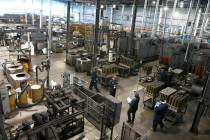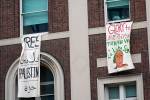Estate tax debate mixed in LV
A new report asserts that reviving the estate tax will kill jobs, but local experts disagree on how much of an effect the renewed levy would have.
The American Family Business Foundation, a small-business advocacy group in Washington, D.C., found that reinstating the estate tax could curb economic expansion in coming years as business owners modify their operating plans to accommodate the levy, though some observers say there's no evidence that the tax forces business owners to operate their companies differently over a lifetime.
The estate tax disappeared in 2010 as a result of a law that gradually phased it out, but it's scheduled to return in 2011, when estates will be taxed 55 percent on assets worth more than $1 million.
The foundation's research review, called "Growth Consequences of Estate Tax Reform," found that a 15 percent estate tax would cost 363,300 jobs over 20 years, the report said. At 2011's scheduled rate of 55 percent, the job loss would come to 1.4 million positions. Boost it to 65 percent, as Rep. Bernie Sanders, I-Vt., suggests, and 1.6 million positions would disappear, the study found.
A host of reasons could be behind an estate tax-spurred drop in hiring, said Douglas Holtz-Eakin, the study's co-author and president of policy-research institute the American Action Forum. Some companies might curb growth to stay within the exempted amount below which they don't have to pay taxes. Others might buy life-insurance policies designed to pay the estate tax, and the ensuing premiums would leave less cash for hiring and capital investments.
"Most of these businesses are very cash-flow sensitive, so anytime you rob them of cash flow, it's bad news," Holtz-Eakin said. "The studies that give us the evidence don't distinguish why, but they basically say people look at the estate tax in the prime years of their lives, and it influences them. It causes people to accumulate less wealth in general, and in a family business, where wealth is concentrated in the business itself, businesses respond to those taxes in slower growth, with less in the way of hiring and lower pay for those they hire."
It appears a story about the estate tax is about as popular as, well, death and taxes, because the Review-Journal couldn't get a single local business owner to comment on this story. So it's tough to determine what local companies think when it comes to paying the levy, and whether it affects how they plan for their companies.
But at least one think tank disagrees with the report.
Michael Linden, associate director for tax and budget policy at the Center for American Progress in Washington, D.C., said there's no evidence business owners treat the estate tax as a marginal rate that affects them throughout their lifetimes. What's more, Linden said, the study inflates the number of people who'll pay the tax to 5 percent, when just 0.3 percent of Americans actually end up handing over the levy.
Most importantly, though, the government must raise revenue for national defense, infrastructure and immigration enforcement, among other federal functions, Linden said. The estate tax as it's set to be reinstated would bring in $250 billion over the next decade. Eliminating it permanently would require other tax increases, and because the estate tax doesn't penalize hiring or consumption, it's less likely to change behaviors than income or sales taxes, Linden said.
But Holtz-Eakin said statistics he obtained from the Internal Revenue Service show business owners do alter their behaviors to prepare for the estate tax's burden on their companies. And though a small number of people will actually pay the tax, far more believe they might be subject to it, and that perception drives their decisions.
Local estate attorneys disagree on whether their clients adjust their business practices to prepare for the estate tax.
Jeffrey Burr, a certified public accountant and attorney who owns the law firm of Jeffrey Burr Ltd., said family-business owners "definitely" shape their long-term plans around that final tax. Business owners do indeed slow growth to avoid exemptions, and life insurance to cover their estate taxes can cost at least $20,000 to $25,000 a year for a healthy 60-year-old executive, he said.
The biggest economic toll often comes when families have to cover a big tax bite. Coming up with cash to settle the estate can easily cut the number of employees a business can afford. It can even affect the company's very viability, Burr said.
"Sometimes these businesses have to be sold. Sometimes they have to close," he said. "Sometimes they let employees go and cut costs to try to pay the tax."
But Heidi Freeman, an attorney with the Law Offices of Oshins & Associates in Las Vegas, said she hasn't seen indications that her clients are changing their behaviors to dodge the estate tax. Nor has she seen a big influx of business owners panicking about the coming reinstatement of the tax, though she expects that to change as Jan. 1 draws closer.
"(The estate tax) can have a drastic impact on family businesses at the time of the owner's death, because the family needs to come up with money to pay it," Freeman said. "But I don't think it affects them during the lifetime of the owner. That's not something I've seen."
Contact reporter Jennifer Robison at
jrobison@reviewjournal.com or 702-380-4512.























